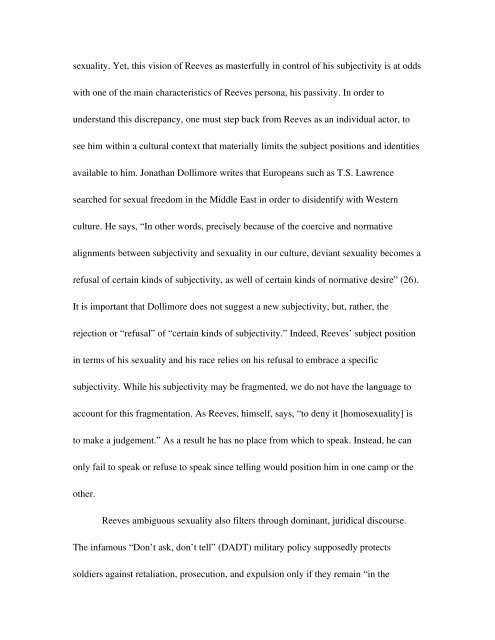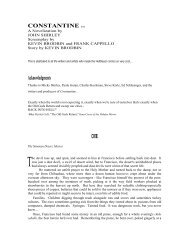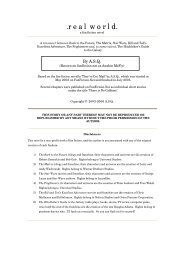Queer Keanu: Race, Sexuality and the Politics of - Whoa is (Not) Me
Queer Keanu: Race, Sexuality and the Politics of - Whoa is (Not) Me
Queer Keanu: Race, Sexuality and the Politics of - Whoa is (Not) Me
You also want an ePaper? Increase the reach of your titles
YUMPU automatically turns print PDFs into web optimized ePapers that Google loves.
sexuality. Yet, th<strong>is</strong> v<strong>is</strong>ion <strong>of</strong> Reeves as masterfully in control <strong>of</strong> h<strong>is</strong> subjectivity <strong>is</strong> at odds<br />
with one <strong>of</strong> <strong>the</strong> main character<strong>is</strong>tics <strong>of</strong> Reeves persona, h<strong>is</strong> passivity. In order to<br />
underst<strong>and</strong> th<strong>is</strong> d<strong>is</strong>crepancy, one must step back from Reeves as an individual actor, to<br />
see him within a cultural context that materially limits <strong>the</strong> subject positions <strong>and</strong> identities<br />
available to him. Jonathan Dollimore writes that Europeans such as T.S. Lawrence<br />
searched for sexual freedom in <strong>the</strong> Middle East in order to d<strong>is</strong>identify with Western<br />
culture. He says, “In o<strong>the</strong>r words, prec<strong>is</strong>ely because <strong>of</strong> <strong>the</strong> coercive <strong>and</strong> normative<br />
alignments between subjectivity <strong>and</strong> sexuality in our culture, deviant sexuality becomes a<br />
refusal <strong>of</strong> certain kinds <strong>of</strong> subjectivity, as well <strong>of</strong> certain kinds <strong>of</strong> normative desire” (26).<br />
It <strong>is</strong> important that Dollimore does not suggest a new subjectivity, but, ra<strong>the</strong>r, <strong>the</strong><br />
rejection or “refusal” <strong>of</strong> “certain kinds <strong>of</strong> subjectivity.” Indeed, Reeves’ subject position<br />
in terms <strong>of</strong> h<strong>is</strong> sexuality <strong>and</strong> h<strong>is</strong> race relies on h<strong>is</strong> refusal to embrace a specific<br />
subjectivity. While h<strong>is</strong> subjectivity may be fragmented, we do not have <strong>the</strong> language to<br />
account for th<strong>is</strong> fragmentation. As Reeves, himself, says, “to deny it [homosexuality] <strong>is</strong><br />
to make a judgement.” As a result he has no place from which to speak. Instead, he can<br />
only fail to speak or refuse to speak since telling would position him in one camp or <strong>the</strong><br />
o<strong>the</strong>r.<br />
Reeves ambiguous sexuality also filters through dominant, juridical d<strong>is</strong>course.<br />
The infamous “Don’t ask, don’t tell” (DADT) military policy supposedly protects<br />
soldiers against retaliation, prosecution, <strong>and</strong> expulsion only if <strong>the</strong>y remain “in <strong>the</strong>













